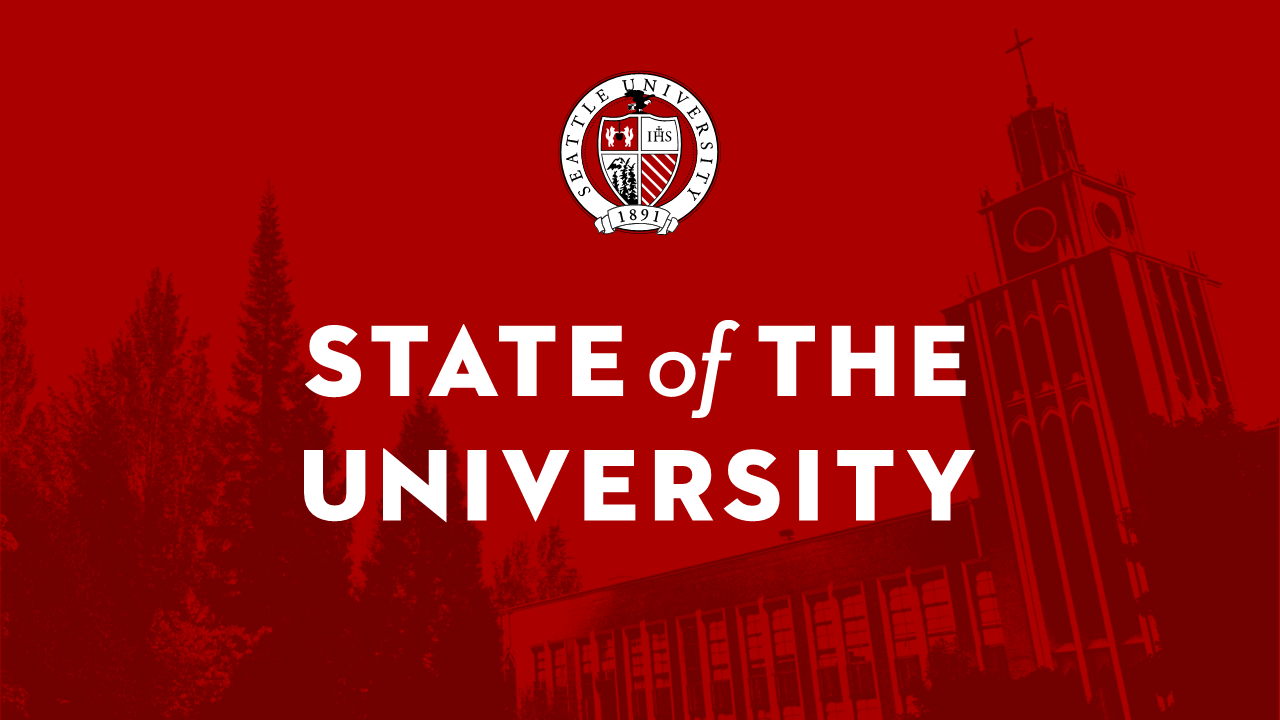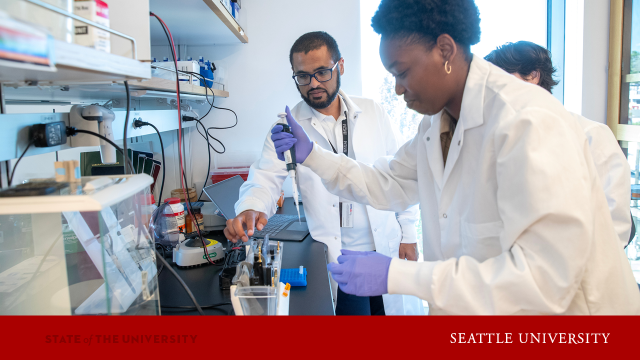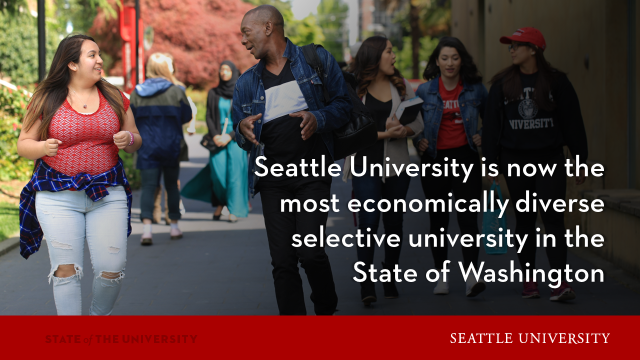No Caption Provided
May 1, 2024
President Eduardo Peñalver delivered the following remarks at the 2024 State of the University on April 26. Watch the video here »
Today, the challenges we face often seem daunting. The events over the past two weeks on campuses across the country could not have made that clearer.

Our challenges include declining trust in higher education, which has led to a loss in faith in the value of a college degree, despite the evidence that a college education continues to be the surest pathway out of poverty.

They include political polarization and the state of civil discourse on campus, which contribute to the declining trust in higher education, and which have torn many university communities apart over the past few weeks.

More broadly, as a global society, we are confronting significant, seemingly existential challenges. These include climate change and the imperative to create a sustainable future; widening economic inequality and a legacy of racial inequity and division; and, finally, rapid (and accelerating) technological change, which threatens to upend our social and political institutions even as it creates both economic dynamism and opportunity.
At Seattle University, our mission to empower leaders for a just and humane world calls us to help our students (and by extension, our society) to understand and grapple with all these challenges. And, as Seattle’s Jesuit university, we are well positioned to undertake this work in a way that is distinctive within in our region and beyond.
Our Jesuit approach to educating our students goes beyond affording them technical expertise. It does that, to be sure. But it also offers them tools to apply critical perspectives and to engage their deepest values. It pushes against the limits of disciplinary boundaries – bringing philosophical and theological reflection into dialogue with science and engineering and law and policy. This is why we call Seattle University the place “where innovation meets humanity.”
In pursuing this ambitious educational project, there is no question that we benefit from our presence here in Seattle. At the same time Seattle – with all its dynamism and innovation – benefits from the distinctive approach to higher education we offer.
There is simply no place better than a Jesuit university in Seattle to undertake this important work, situated as we are here in this global hub of innovation – the home of Microsoft, Amazon, Costco, Boeing, T-Mobile, and so many others.
In his 2000 address at Santa Clara University, Father General Hans Kolvenbach – the 29th Superior General of the Society of Jesus – described the project of Jesuit higher education in a context like ours. Although he was speaking in the heart of Silicon Valley at the height of the LAST tech boom, his words continue to ring true here in Seattle two decades later:
Enormous talent and unprecedented prosperity are concentrated [here] . . . . This is the headquarters of the new economy that reaches around the globe and is transforming the basic fabric of business, work, and communications. Thousands of immigrants arrive [here] from everywhere: entrepreneurs from Europe, high-tech professionals from South Asia who staff the service industries as well as workers from Latin America and Southeast Asia who do the physical labor—thus, a remarkable ethnic, cultural, and class diversity. At the same time . . . [we] struggle[] with new social divisions aggravated by ‘the digital divide’ between those with access to the world of technology and those left out. This rift, with its causes in class, racial, and economic differences, has its root cause in chronic discrepancies in the quality of education.
At Seattle University, our mission helps us better understand and overcome those contrasts and divisions even while harnessing the insights and opportunities presented by Seattle’s influx of talent and prosperity.
Deploying the Jesuit educational model to create transformational leaders who will become men and women for and with others, Seattle University offers a distinctive antidote to the challenges Father General Kolvenbach described.
The “Seattle University antidote” has three key ingredients.
The first and most fundamental is the excellence of our academic program.
Our dynamic and committed faculty create and embody this excellence every day. They do this through their superb teaching and through their cutting edge, relevant research and creative works – research like Professor Shen Ren’s portable, artificial kidney, which promises to free millions of people around the world from the need to go to dialysis centers.
Our faculty’s interest in teaching and research do not compete with one another, as they often do at other, more exclusively research-focused universities. At those institutions, undergraduates have to search and scramble to find opportunities to participate in research, with highly variable results. At Seattle University, our faculty routinely build their research programs with undergraduate involvement in mind from the start.
For example, last August, the prestigious medical journal Nature Microbiology published a study by Seattle University chemistry professor Christopher Whidbey, who authored the article with two Harvard University researchers, but who also made sure to include two Seattle University undergraduates as his co-authors.
In supporting Seattle University’s academic excellence, we aim to take full advantage of our Seattle location, collaborating with the leading nonprofits and technology companies that make our city a global hub of experimentation and innovation.
This past year, we partnered with T-Mobile to make Seattle University a 5G campus, and we look forward to working with T-Mobile to build an innovation center that will bring together students, faculty, and industry to find new applications of cutting-edge wireless technology. (You will hear more about our collaboration with T-Mobile as part of today’s program.)
So academic excellence is the first ingredient in the Seattle University antidote.
The second key ingredient is our diversity.
Jesuit colleges and universities were founded to serve Catholic immigrants who (at the time) were excluded from many institutions of higher learning. Over the years, we have come to understand our mission of expanding educational access to encompass all those who had historically been excluded from opportunity.
Our commitment to diversity is deeply connected to our Jesuit mission because, as the Catholic philosopher Charles Taylor has put it, “[h]uman diversity is part of the way in which we are made in the image of God.”
We are proud that Seattle University is now the most economically diverse selective university in the State of Washington.
And we are proud to be the first selective university in the state of Washington to be designated a Minority Serving Institution by the United States Department of Education. The federal government recently certified Seattle University as an Asian American Native American Pacific Island Serving Institution. This designation makes Seattle University eligible for grant aid to support the success of our students.
Our commitment to creating a diverse and inclusive academic community does not undermine our equally strong commitment to academic rigor and excellence. To the contrary, the two commitments reinforce one another other as essential elements of our mission.
As such, neither has meaning without the other. Providing the opportunity for a Seattle University education to a diverse student body is pointless if that education is not excellent, and if it is not recognized as excellent by others.
At the same time, even the most excellent Seattle University education would be a betrayal of our Jesuit values if it were not accessible to students of diverse backgrounds and means.
In their 2002 book, William Barry and Robert Doherty described Jesuit spirituality as “a spirituality of tensions.”
They described those tensions as dynamic and life-giving. But, like a rope pulled from both sides, tension remains creative and dynamic only when both sides pull.
As Father Ignacio Ellacuría made clear in a 1982 address, Jesuit universities need to attend equally to their commitments to making the world more just and to sustaining the excellence of their academic programs.
In his words:
A Christian university must take into account the Gospel preference for the poor. [But this] does not mean that only the poor [should] study at the university; it does not mean that the university should abdicate its mission of academic excellence—excellence needed in order to solve complex social problems. It does mean that the university should be present intellectually where it is needed: to provide science for those who have no science; to provide skills for the unskilled; to be a voice for those who do not possess the academic qualifications to promote and legitimate their rights.
In addition to our excellence and our diversity, the final essential ingredient in Seattle University’s antidote is our reliance on a 500-year-old Jesuit model of education that emphasizes personal encounter, relationship, experience, and deep reflection as pathways to understanding and transformation.
In an increasingly digital world – a world of ubiquitous screens, where social media increasingly supplants genuine personal engagement, where the facile and provocative tweet replaces the thoughtful conversation – the Jesuit model of higher education calls us to true intellectual and personal encounter.
In a world full of intellectual junk food, Seattle University offers the rich educational equivalent of the family dinner.
And, as at a family dinner, the conversations we encourage at Seattle University should be nourishing and life-giving, even as they are sometimes contentious. And, as at a family dinner, those conversations are animated by the belief that difficult discussions are more productive and effective when they are rooted in real relationship – in mutual regard.
This past year, on our campus, we have worked to promote a climate for productive discourse and substantive engagement through various speaker series. Whether it was our presidential speaker series focused on campus discourse or a faculty-led series focused on the violent conflict in Israel and Gaza, we have aimed to bring to our community speakers who represent a diversity of viewpoints and who model constructive engagement across disagreement.

These series have included speakers like New York Times columnist David French; the journalist and author Eric Alterman; and representatives of the NGO Sharaka, a people-to-people initiative that emerged out of conversations among youth leaders from Israel and various Gulf states in the wake of the 2020 Abraham Accords.
In addition to an emphasis on thoughtful personal engagement, the Jesuit approach to education is also known for the engagement it fosters among the disciplines. The graduates of Jesuit universities are technically excellent, but they also bring to their expertise a breadth of intellect that is the trademark of Ignatian pedagogy.
As part of our Reignited Strategic Directions, our faculty are hard at work reimagining and revising our curriculum – including our core curriculum – to ensure that the interdisciplinary education we offer our students is well suited to prepare them to grapple with the challenges they will face when they leave our campus, so they are equipped to lead our society towards greater justice and humanity.
No matter what they are studying, our students need to be able to understand the basic science of climate change and the imperative to build a sustainable future. They should be able to understand mechanisms of racial and economic inequity. They should recognize the impacts of rapid technological change on the vital institutions of our pluralistic democracy. And they should understand these issues through a variety of disciplinary lenses. As Pope Francis made clear in Laudato Si, climate change is not just a technical, scientific problem. It is also an economic problem, and a social problem, and an ethical problem.
As part of the reimagination of our curriculum, Seattle University will also reaffirm our commitment to making Seattle our classroom by making community-engaged service learning an essential feature of the Seattle University undergraduate experience.
Finally, the Jesuit model of education includes every aspect of our students’ personality – from their intellect to their imaginations.
It includes our students’ physical well-being. It is no accident that Jesuit universities tend to excel in athletics. And Seattle University is no exception.

We just enjoyed our third straight 20-win season in Men’s Basketball (the first time this has happened in over 50 years). They also won the College Basketball Invitational tournament – our first men’s postseason basketball tournament championship in our 130 year history. And our women’s golf team just won the Western Athletic Conference championship – another first for Seattle University.
Throughout our history, Jesuit universities have inspired students’ minds and spirits by exposing them to the visual and performing arts.
So it is entirely in keeping with our Jesuit values that Seattle University is in the process of launching the Seattle University Museum of Art, which will house the remarkable Betty and Dick Hedreen Collection. Spanning more than five centuries of art history, the Hedreen collection will provide our students with access to some of the finest works of art produced over the same period of time the Jesuits have been in existence.
View a gallery featuring some of the other works in the collection.
With our location here at the base of First Hill, at the intersection of the Central District, the International District, and Yessler Terrace, our commitment to community engagement means that the creation of this museum will also provide unprecedented access to art for communities that have historically lacked it.
We are grateful to Dick and Betty Hedreen – and the entire Hedreen family – for making the largest gift in the history of Seattle University – indeed, the largest single gift ever to a university in the state of Washington.
***
In short, these are challenging but exciting times for Seattle University.
Meeting the many challenges to higher education and to society will require our university to embrace change and action.
Our roadmap for the change we need to make is our Reignited Strategic Directions.
At the broadest level, Seattle University’s reignited strategic directions calls on us to make deep and sustained change to prepare the university to grapple with a rapidly evolving higher education landscape.
With the exception of the Foundational Goal, each of our strategic goals calls on us to change some fundamental aspect of Seattle University’s status quo.
- Reimagine
- Strengthen
- Enhance
- Promote
- Reposition
These are words of transformation and motion.
Even the Foundational Goal – remaining anchored in our Jesuit character –is not an exception to this pattern. After all, the essence of the Jesuit spirit is a comfort with change.
Remaining in place is NOT a JESUIT value.
Jesuits are called to be “contemplatives in action.” And as a Jesuit university, we are called to embrace that same comfort with change.
At their 34th General Congregation in 1995, the Jesuits described innovation as central to their identity:
Jesuits are never content with the status quo, the known, the tried, the already existing. We are constantly driven to discover, redefine and reach out for the magis.
For Seattle University, becoming more authentically Jesuit means becoming more open to change, less attached to the status quo.
At the beginning of the year, I told our community that Seattle University’s word for the year is “¡Ahora!”

Those of you who speak Spanish know that “ahora” means “now.” Not a vague “now…when I get around to it,” but “right now!”
“Ahora,” does not call us to embrace change for its own sake, or to a mindless pursuit of novelty. The word focuses our attention on the signs of our times – on the context in which we find ourselves now (ahora).
“Ahora” captures the urgency of the challenges higher education is facing now. And it communicates the Jesuit embrace of change, when that is what the times require.
“Ahora” calls us to be a university in motion.
Tonight, we will hear from a number of university leaders about the many ways in which Seattle University is becoming just that kind of place.
I hope you enjoy the discussion.








